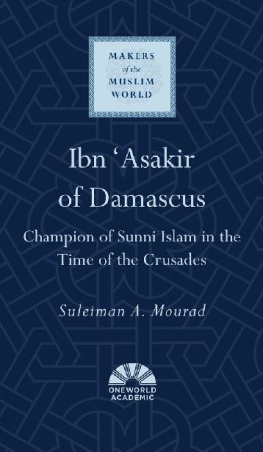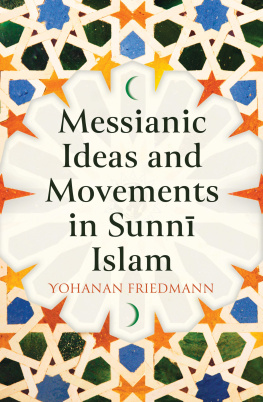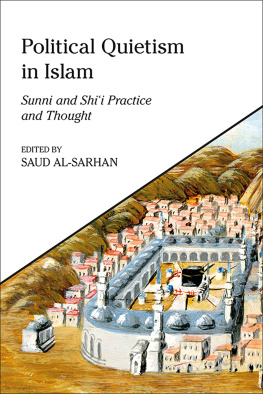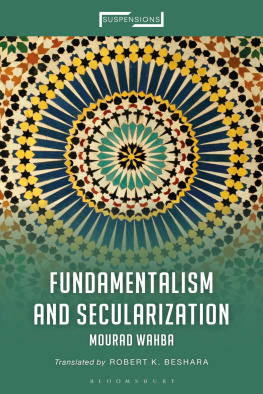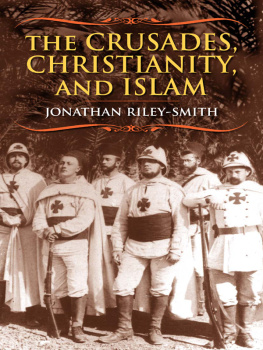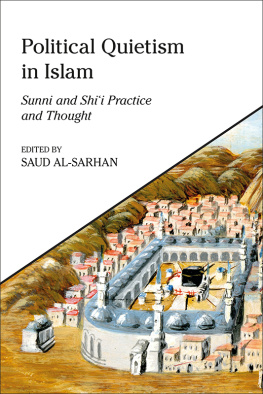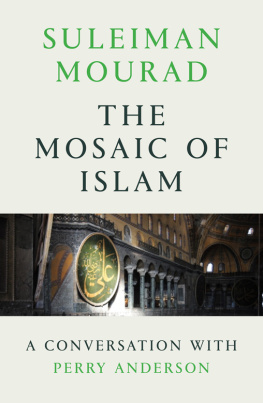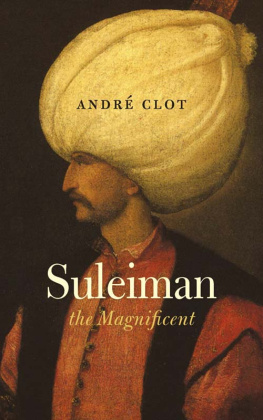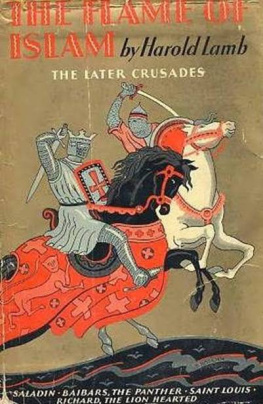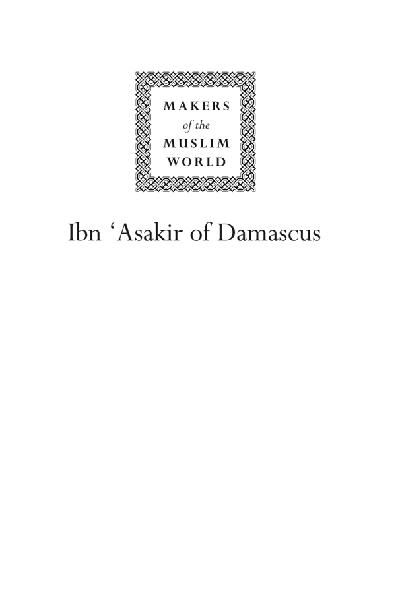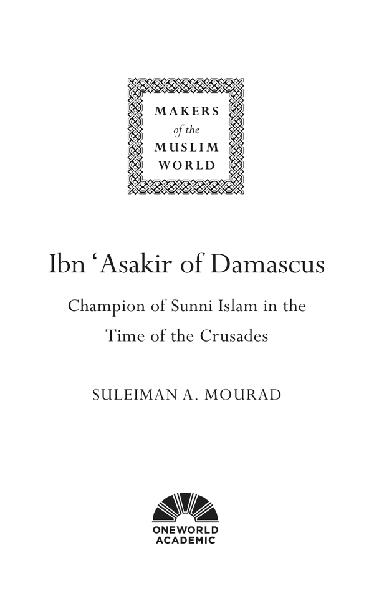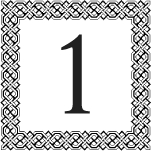TITLES IN THE MAKERS OF THE MUSLIM WORLD SERIES
Series Editors: Professor Khaled El-Rouayheb, Harvard University, and Professor Sabine Schmidtke, Institute for Advanced Study, Princeton
Abd al-Ghani al-Nabulusi , Samer Akkach
Abd al-Malik , Chase F. Robinson
Abd al-Rahman al-Kawakibi , Itzchak Weismann
Abd al-Rahman III , Maribel Fierro
Abd al-Rahman b. Amr al-Awzai , Steven C. Judd
Abu Nuwas , Philip F. Kennedy
Ahmad al-Mansur , Mercedes Garca-Arenal
Ahmad ibn Hanbal , Christopher Melchert
Ahmad ibn Tulun , Matthew S. Gordon
Ahmad Riza Khan Barelwi , Usha Sanyal
Aisha al-Bauniyya , Th. Emil Homerin
Akbar , Andr Wink
Al Mamun , Michael Cooperson
Al-Mutanabbi , Margaret Larkin
Amir Khusraw , Sunil Sharma
Ashraf Ali Thanawi , Muhammad Qasim Zaman
Beshir Agha , Jane Hathaway
Chinggis Khan , Michal Biran
Elijah Muhammad , Herbert Berg
Fazlallah Astarabadi and the Hurufis , Shahzad Bashir
Ghazali , Eric Ormsby
Hasan al-Banna , Gudrun Krmer
Husain Ahmad Madani , Barbara D. Metcalf
Ibn Abd al-Wahhab , Michael Crawford
Ibn Arabi , William C. Chittick
Ibn Hamdis the Sicilian , William Granara
Ibn Taymiyya , Jon Hoover
Ibn Tufayl , Taneli Kukkonen
Ikhwan al-Safa , Godefroid de Callata
Imam Shafii , Kecia Ali
Karim Khan Zand , John R. Perry
Mehmed Ali , Khaled Fahmy
Muawiya ibn Abi Sufyan , R. Stephen Humphreys
Muhammad Abduh , Mark Sedgwick
Mulla Sadra , Sayeh Meisami
Nasser , Joel Gordon
Nazira Zeineddine , Miriam Cooke
Sadi , Homa Katouzian
Shah Abbas , Sholeh A. Quinn
Shaykh Mufid , Tamima Bayhom-Daou
Usama ibn Munqidh , Paul M. Cobb
Uthman ibn Affan , Heather N. Keaney
For current information and details of other books in the series, please visit oneworld-publications.com/makers-of-the-muslim-world
To Dimitri Gutas and Beatrice Gruendler
For their unwavering support and friendship over the years
CONTENTS
NOTES
A few remarks are in order to clarify certain choices I followed in this book. In general, all names are rendered according to the way they are spelled, except in those cases where the person or the place is already very familiar by an Anglicized name, such as Saladin (not Salah al-Din) and Damascus (not Dimashq).
If a person is not familiar in English, I gave their Arabic name, invariably the one they were famous by. This could be Abu X (father of X) or Umm X (mother of X), or X b./bt. Y (X son/daughter of Y), or Ibn/Bint X (son/daughter of X). To illustrate: Ibn Asakir was known as Abu al-Qasim Ali b. al-Hasan al-Dimashqi. Abu al-Qasim was his honorific, Ali was his name, al-Hasan was his fathers name, and al-Dimashqi meant he was from Damascus. Since he was known by Ibn Asakir, I use it throughout to refer to him (even though we do not know exactly why the family came to be known by this nickname and whether or not Asakir was an ancestor). Others, like al-Khatib al-Baghdadi, were known by their profession and place of origin; al-Khatib meant the orator, and al-Baghdadi meant the one from Baghdad. Similarly, al-Ashari (the one from the Ashari clan), Ibn al-Mubarak (son of Mubarak), and so on. This also applied to other communities in the Muslim world in premodern times.
In those cases where I give the name of a person in the form of X son of Y or X daughter of Y, I followed the custom in modern scholarship on Islam to render the Arabic word for son ( ibn ) as b., and for daughter ( bint ) as bt., thus X b. Y if it is a man, and X bt. Y if it is a woman.
For all the students of Ibn Asakir, I give their dates of birth as well as their dates of death in order to show the time they could have overlapped with him. I did that as well for all the members of the Asakir family to give an idea about the time in which they lived and flourished.
I use Hadith to indicate the entire body of traditions attributed or transmitted on the authority of the Prophet Muhammad and about him. In contrast, I use hadith to refer to an individual anecdote.
The term Syria is used throughout the book to designate what is commonly known in late antique and medieval Islamic times as Bilad al-Sham . This old Arabic expression originally meant the Lands to the North, that is north of the Arabian Peninsula. It included the countries today known as Syria (except for the parts to the north and north-east of the Euphrates River, which historically were known as Upper Mesopotamia), Lebanon, Jordan, Palestine, and Israel, and the region of Antioch in Turkey. Therefore, the reader should not understand by Syria the current nation-state of Syria.
For dates, I used the Islamic calendar (AH) and the Christian (AD)/Common Era (CE) calendar dating systems. The former is given first followed by the latter: e.g., Ibn Asakir was born in 499/1105, where 499 refers to the Islamic year, and 1105 to the AD/CE year.
And finally, for difficult concepts or names, I provide a Glossary at the end of the book. The first time I mention one of these terms, it is marked by an asterisk ( * ) to indicate that it is explained there.
ACKNOWLEDGMENTS
I have been working on the scholarship of Ibn Asakir for around thirty years. This book benefits directly or indirectly from this long exposure to him and the help I have received during this time from countless institutions and people, too many to list here. I am especially thankful for the generous feedback colleagues have shared with me in several venues, be it at conferences and workshops, or even by reading some of my books and articles on Ibn Asakir and sending me comments and suggestions. Without this collective wisdom, my thinking of Ibn Asakir would not have evolved to the level of writing a book on him and about his contribution to Islamic scholarship and intellectual history.
A work like this one requires a lot of resources and support. I was able to finish it during my sabbatical year 20192020 from Smith College. I am thankful to the generous sabbatical support that the College provides. Moreover, some of the research, specifically for , benefitted from a generous grant from the Gerda Henkel Stiftung (Germany).
I would also like to thank my friend Khaled El-Rouayheb and the editorial team of Oneworlds Makers of the Muslim World series, for publishing this volume on Ibn Asakir and also for valuable guidance and recommendations. I am equally thankful to the anonymous reviewers for their significant feedback and suggestions, and to my friend and colleague James E. Lindsay (another aficionado of Ibn Asakir) for reading the manuscript and sharing with me some very insightful suggestions.
I am also grateful for the magical fingers and entrancing voices of many West African and Cuban musicians whose inspirational tunes accompanied the writing of this book, and created a stimulating atmosphere for the ideas to flow.
THE WORLD OF IBN ASAKIR
Ali Ibn Asakir was a towering figure in medieval Islamic scholarship. Due mostly to his influence and aura, the family became a prominent Sunni * household in medieval Damascus, producing a large number of notable Shafii * scholars, both men and women, who occupied prestigious scholarly, judicial, and administrative positions in Syria and Egypt, and who helped shape the intellectual and religious life there, especially between the fifth/eleventh and eighth/fourteenth centuries. Even though each member of the family was known as Ibn Asakir along with a peculiar honorific, the reference on its own in medieval literature invariably refers to him and thus signifies his eminence within the family.

